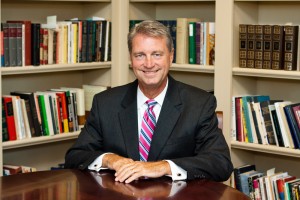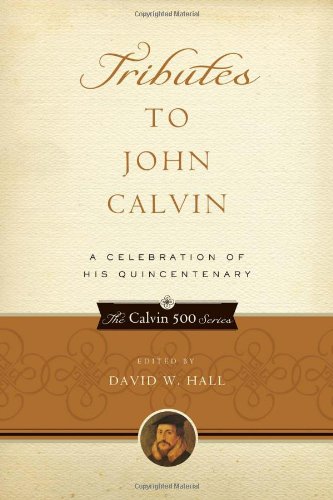Did you ever wonder what preaching was like in earlier days of the church? It might not surprise you to learn that the Reformers made an impact on preaching as well as theology!
Hi, I’m Fred Zaspel, and welcome to Books At a Glance as we continue our discussions with Dr. David Hall about the magisterial Reformer, John Calvin.
David, welcome back! What was preaching like before Calvin? And what changes did he and the other Reformers make?
David Hall:
Hi Fred, thank you for letting me come back.
Preaching has a history since the New Testament of having some ups and downs. There were peak performances, notably from John Chrysostom and a few others, but when you think of preaching as taking the inspired text of holy Scripture, opening up, applying it, breaking it down and making it relevant to our lives, a lot of that simply was not done prior to roughly the 1500s, the time of Calvin and others. One of the great contributions of the Protestant Reformation, and Calvin wasn’t alone in this, was restoring the church’s trust and exposure to the Word of God. That’s indeed what changes. Prior to Calvin, just the century before Calvin’s time you would have found two major signatures of the medieval Catholic worship. The first was the Mass which took center stage and actually served to delimit the time that preaching could occur.
And then secondly, moralisms. Masses and moralisms were the character traits of the preaching prior to Calvin. There would be fables; there would be stories; there would be lessons; and the Word of God was not taken and unwound in any depth. Kind of like some of the southern preaching today. But we won’t get off on that. But prior to Calvin, the guiding force of sermons, and this changed at Calvin’s time, within his generation; prior to that, the lectio selecta was given. A list of passages was given that were sometimes apparently random, but the sequence and the continuity of Scripture wasn’t there. And what changed, the most dramatic change, and still lasting contribution of Calvin and others on preaching, I think, if I could go on and speak that, was to take lectio continua, a sequential method of preaching and follow that.
Now there were a couple of precursors that are a little bit lesser-known, but very important. Wolfgang Capito in 1515, best we can tell, is one of the first Protestants to preach sequentially through books of the Bible. He did that very briefly. Then in January 1, 1519, Ulrich Zwingli in Zürich is well known for beginning his ministry at the Grossmunster in Zürich at that time with an expository sequential series through the book of Matthew. This was a new, radical style. And then John Oecolampadius in Strasburg and Basel and other places in 1525 to 1528, began to preach sequentially.
However, here’s the point. Calvin didn’t begin this all by himself. That being said, however, Calvin perfected this technique and his preaching was sequential. He would work through books of the Bible; he preached many sermons on a regular basis. He wasn’t just an academic in the classroom or the laboratory, but he was with people and he preached, ordinarily, through books of the Bible.
Zaspel:
I think, the first of anything of Calvin that I read was his sermons through Ephesians. Remarkable sermons. How long were those sermons? Are those typical of his preaching?
Hall:
Well, I think they were typical; they weren’t unreasonably long. Again, the Puritans extended the time period about a century later. When you think of an hour or an hour and a half sermons, Calvin’s sermons weren’t that far removed from a 30 minute exposition.
Zaspel:
About thirty minutes?
Hall:
Yes, I haven’t actually done a word count to compare it, but that’s my sense. When you read his sermons on Ephesians, for example, they are not exhausting. They don’t just wear you out and go on and on. Again, he was preaching to a common group of people, citizens of his time, some very well-educated, some not. So the pastor/preacher has to be a little bit sensitive to his environment.
Zaspel:
What were the big ideas that undergirded Calvin’s view of preaching?
Hall:
Two things strike me. First, his very strong commitment to the authority, reliability, inerrancy of Scripture. Whatever term you want to use, use the strongest term. Calvin believed that Scripture was God’s Word inspired to us, and it was a voice that we should respect. And we should come to Scripture and we should hear it as the very Word of God – the God-breathed sentences and phrases from the mind of our Lord. So, a real strong commitment to the authority of Scripture. Calvin saw himself as under that, not really permitted to edit or change or overly tailor the Word of God, but his job was to be a herald and to proclaim what God had said. He was a messenger.
Secondly, and I think sometimes Calvin is forgotten for this, B. B. Warfield called him the theologian of the Holy Spirit. People certainly don’t think of Calvin as a Pentecostal, and shouldn’t, but this was a man who believed deeply in the working of the Holy Spirit. In fact, he was so brave and courageous about his convictions that he was willing to preach week in and week out, day in and day out, in different public fora; and stand there with the Word of God and trust that the Holy Spirit would knead his word into our hearts and form our spiritual character. It’s a rather bold philosophy of ministry, and it’s actually one that has had great impact over the history of the church. So, those two things – his commitment to the Word, his commitment to the Spirit, and particularly those working together. Word and Spirit together in anointed preaching.
Zaspel:
How often did Calvin preach?
Hall:
Well, there are a couple of periods, but in his final residency at Geneva, he preached about 20 sermons a month. He averaged preaching four or five times a week. And his pattern was to normally teach on New Testament texts on Sunday mornings. During the week they would have public services. They would preach on Old Testament texts during the week, and then at their second Lord’s day service, on Sunday afternoon, he would preach often on Psalms. And you mentioned Calvin’s sermons on Ephesians. He preached over 200 sermons on the book of Deuteronomy. He is well known for 159 sermons on Job, 110 on 1 Corinthians, and a number of others. I just want to say, if I could, that reading Calvin’s Institutes is great, reading his commentaries is even better. If you can get his sermons, and many of those are being published or republished, that is Calvin at his best. And you will see a pathos; you will see a humanity; you will see a true piety in his sermons, I think, more reflective than in any other of his writings.
Zaspel:
Before we leave tell us about the series of books you have edited for P&R.
Hall:
On the subject of preaching, we had some sermons in Geneva in 2009 from some just luminous pastors, Steve Lawson, Joel Beeke, Sinclair Ferguson and many others and that’s in a volume by P&R called, Preaching Like Calvin, that was published in 2010. P&R also did a total of seven or eight different books. Calvin and Culture is one; Calvin in the Public Square is my book on his view on politics. There’s a short little book that P&R did that’s almost a big pamphlet called The Legacy of John Calvin, that includes a biographical sketch, as well as 10 ways he shaped and influenced the West. So we like to recommend the series. And also there’s a video that was shot on this 2009 conference, that’s free, and if I could give the website, it’s theprotestantrevolt.com. A simple website, great graphics. You can use them in your Sunday school classes and it’s free. There are ten or eleven different episodes timed to be about 22-23 minutes, to fit on a PBS-type program.
Zaspel:
We’ll be sure to provide that link on the website and also links to all of those books, as well.
Thanks again for joining us on Books At a Glance as we continue our highlights of the Protestant Reformation. Next time Dr. Hall will talk to us about John Calvin’s impact on government and politics. We hope you’ll join us then.
Editor’s Note: Here are some related resources from Dr. David Hall
Tributes to John Calvin: A Celebration of His Quincentenary
wtsbooks
Amazon
Lectures on Integrity: A Review of Confessional Subscription as an Aid for Orthodoxy and Orthopraxy
Amazon
Post Tenebrae: Essays on Calvin and Calvinism
Amazon
The Genevan Reformation and the American Founding
Amazon
To Glorify and Enjoy God: A Commemoration of the 350th Anniversary of the Westminister Assembly (co-author with John L. Carson)
wtsbooks
Amazon
The Legacy of John Calvin (2008)
wtsbooks
Amazon
Calvin and Commerce: The Transforming Power of Calvinism in Market Economies (2009)
wtsbooks
Amazon
Preaching Like Calvin: Sermons from the 500th Anniversary Celebration (2010)
Amazon
Calvin in the Public Square: Liberal Democracies, Rights and Civil Liberties (2009)
wtsbooks
Amazon
Essays in Calvin and Calvinism (kindle editions, 2014-2015)
Volume 1
Volume 2
Volume 3
A Theological Guide to Calvin’s Institutes: Essays and Analysis (2008, 2015) (with Peter Lillback)
wtsbooks
Amazon
Calvin and Culture: Exploring a Worldview (2010) (with Marvin Padgett)
wtsbooks
Amazon

